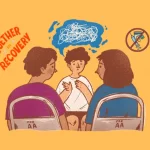
Alcohol has been a problem for as long as history can remember.
At one point or the other, alcoholism leads to the disruption of peace or the smooth flow of a process.
You would think that humans should have learned their lessons over the years, and drink less – well, that is hardly the case.
It seems nothing can separate humans from excessive alcohol use, not even the fact that it is the third leading preventable cause of death.
Sadly, alcoholism is hardly ever the problem of the alcoholic alone. In most cases, it is also the problem of people around them.
If you have an alcoholic spouse, you might have to deal with it.
Who is regarded as an alcoholic spouse?
Having an occasional drink at reasonable levels can be regarded as healthy.1
Unfortunately, the line between being a moderate drinker and an alcoholic is a thin one, and it is not so hard to crossover unknowingly. That might be why your spouse, who wasn’t an alcoholic from the onset, is one now.
So, at what point do you consider your spouse an alcoholic?
The National Institute on Alcohol Abuse and Alcoholism (NIAAA) provided an extensive guide on how to know if an individual is an alcoholic or suffering from Alcohol Use Disorder (AUD).2
It is important to note that AUD is a chronic relapsing brain disease, which is typified by compulsive alcohol use, loss of control, and negative emotions. Below are some NIAAA guidelines you can use to determine if your spouse is an alcoholic.
Does your spouse:
- Drink more than or longer than they intend sometimes?
- Continue to drink despite underlying health problems, memory blackouts, or depression caused by drinking?
- Consume more alcohol than they used to because the usual number has less effect than before?
- Try to cut down on drinking, but can’t?
- Crave for a drink randomly?
- Drink to the point that its aftereffects interfere with their responsibilities at home or work?
- Drink even when it leads to trouble with family and friends?
- Experience withdrawal symptoms such as anxiety, depression, nausea, sweating, trouble sleeping, etc., when the alcohol effects begin to wear off?
- Drink heavily before embarking on hazardous activities such as driving, swimming, or the use of machinery?
By answering these questions, you will be able to determine if your spouse is an alcoholic.
What are the impacts of having an alcoholic spouse?
Alcoholism in households has long been a point for discussion by various organizations in the United States.
In 1991, the Center for Disease control carried out an extensive survey, which revealed that 43 percent of the U.S adults were exposed to alcoholism in the family.
The survey also revealed that among the many risks posed by an alcoholic spouse, genetic and environmental exposure to alcoholism influence individuals to become alcoholics themselves.3
This implies that the spouse and children of an alcoholic are likely to become alcoholics in the long run.
The family members of an alcoholic are also at risk of some adverse psychological, financial, physical, social, and economic conditions surrounding alcoholism.
Under the heavy influence of alcohol, your spouse is more likely to make poor financial decisions that deplete family resources and put the household in an unpleasant economic situation.
Also, in an attempt to hide the alcoholism or its effects (such as physical abuse) from the extended family or friends, family members might withdraw from social circles.
Alcoholism in spouses also factors in comorbid psychiatric disorders, which may influence or disrupt various family processes.
Studies have also shown that partners of alcoholic spouses may also developmental disorders which may be associated with their spouse’s alcoholism.4
How do you help your alcoholic spouse deal with alcoholism?

Photo by Juan Pablo Serrano Arenas from Pexels
From all that’s been discussed, you can see why it is important to check or investigate a perceived or confirmed alcohol addiction.
Leaving it to aggravate in a bid to protect the image of your spouse will only lead to worse situations.
If you have kids, helping your spouse to deal with alcoholism also reduces the risks of your children having a major depressive disorder, conduct disorders, attention deficit hyperactivity, or substance dependence in the future.5
There are various ways you can help your spouse deal with alcoholism. We will address how you can help an alcoholic spouse at home before, during, and after receiving professional help.
Providing help at home
Helping your partner deal with alcoholism at home should always come from a place of love, but that doesn’t mean you should be an enabler.
Try as much as possible to ensure that your actions or reactions don’t in any way influence your alcoholic spouse to imbibe.
As well, you should avoid accusatory discussions/arguments. While those might be intended to let your spouse see faults in their behavior, the result is most unpleasant.
In situations where your partner shows interest to quit, you should support their decisions, as well as help them keep up with any recovery process they embark on.
Be their guide, but not such that you become too imposing, neither should you be so compassionate that you let them slip up occasionally.
Instead, encouraging and helping them move to a Houston Sober Living home will go a long way in their recovery, and will leave no room for relapse.
On the other hand, your alcoholic partner might be one that insists that they are not a problem drinker, and do not need any form of help.
Cases like this are tricky and would require you to be steadfast. Firstly, you should know that keeping this to yourself or thinking that you can deal with it all by yourself is not the right approach.
You can solicit the help of close family members or friends that your partner listens to, so they help in encouraging your alcoholic spouse to take steps towards quitting.
During a survey, some individuals listed some benefits of alcohol in their marriage, such as that it makes their partner more open, romantic, and fun to be with.4
In most, if not all cases, the downsides outweigh these little benefits. If you genuinely wish to help your partner deal with alcoholism, you will need to forego these benefits. Opt for other forms of beverages, if you are looking for a good time.
Seeking professional help
Problem drinking and AUD are treatable conditions. Empirical studies have shown that mutual support groups’ behavioral treatment methodologies,6 such as those used by Houston Sober Living home, are effective means of treating alcohol disorder.
Besides behavioral treatments and therapies, pharmacological interventions have also formulated medications that help in the lasting treatment of problem drinking.
During a medically-supervised stay at an Austin drug detox program, recovery specialists will help your alcoholic spouse overcome alcoholism, using tested and confirmed procedures or medications.
Take a step to protect your marriage, kids’ future, and the overall physical and mental health of your family today.
References:
- https://www.hsph.harvard.edu/nutritionsource/healthy-drinks/drinks-to-consume-in-moderation/alcohol-full-story/
- https://www.niaaa.nih.gov/alcohol-health/overview-alcohol-consumption/alcohol-use-disorders
- https://www.cdc.gov/nchs/data/ad/ad205.pdf
- https://www.ncbi.nlm.nih.gov/pmc/articles/PMC2667243/
- https://www.researchgate.net/publication/276019623_Psychological_impact_of_adult_alcoholism_on_spouses_and_children
- https://advances.sciencemag.org/content/5/9/eaax4043?rss=1




